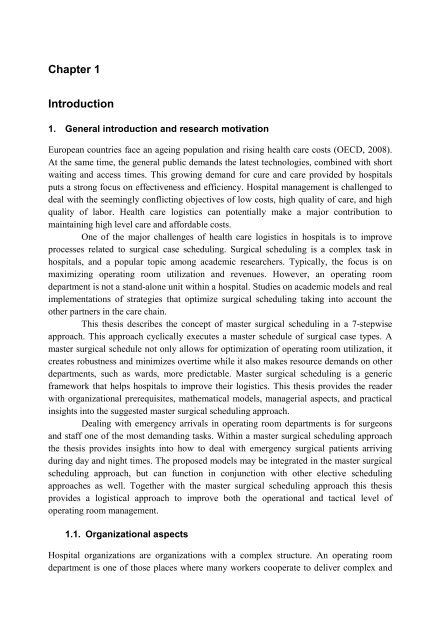Applying mathematical models to surgical patient planning
Applying mathematical models to surgical patient planning
Applying mathematical models to surgical patient planning
Create successful ePaper yourself
Turn your PDF publications into a flip-book with our unique Google optimized e-Paper software.
Chapter 1<br />
Introduction<br />
1. General introduction and research motivation<br />
European countries face an ageing population and rising health care costs (OECD, 2008).<br />
At the same time, the general public demands the latest technologies, combined with short<br />
waiting and access times. This growing demand for cure and care provided by hospitals<br />
puts a strong focus on effectiveness and efficiency. Hospital management is challenged <strong>to</strong><br />
deal with the seemingly conflicting objectives of low costs, high quality of care, and high<br />
quality of labor. Health care logistics can potentially make a major contribution <strong>to</strong><br />
maintaining high level care and affordable costs.<br />
One of the major challenges of health care logistics in hospitals is <strong>to</strong> improve<br />
processes related <strong>to</strong> <strong>surgical</strong> case scheduling. Surgical scheduling is a complex task in<br />
hospitals, and a popular <strong>to</strong>pic among academic researchers. Typically, the focus is on<br />
maximizing operating room utilization and revenues. However, an operating room<br />
department is not a stand-alone unit within a hospital. Studies on academic <strong>models</strong> and real<br />
implementations of strategies that optimize <strong>surgical</strong> scheduling taking in<strong>to</strong> account the<br />
other partners in the care chain.<br />
This thesis describes the concept of master <strong>surgical</strong> scheduling in a 7-stepwise<br />
approach. This approach cyclically executes a master schedule of <strong>surgical</strong> case types. A<br />
master <strong>surgical</strong> schedule not only allows for optimization of operating room utilization, it<br />
creates robustness and minimizes overtime while it also makes resource demands on other<br />
departments, such as wards, more predictable. Master <strong>surgical</strong> scheduling is a generic<br />
framework that helps hospitals <strong>to</strong> improve their logistics. This thesis provides the reader<br />
with organizational prerequisites, <strong>mathematical</strong> <strong>models</strong>, managerial aspects, and practical<br />
insights in<strong>to</strong> the suggested master <strong>surgical</strong> scheduling approach.<br />
Dealing with emergency arrivals in operating room departments is for surgeons<br />
and staff one of the most demanding tasks. Within a master <strong>surgical</strong> scheduling approach<br />
the thesis provides insights in<strong>to</strong> how <strong>to</strong> deal with emergency <strong>surgical</strong> <strong>patient</strong>s arriving<br />
during day and night times. The proposed <strong>models</strong> may be integrated in the master <strong>surgical</strong><br />
scheduling approach, but can function in conjunction with other elective scheduling<br />
approaches as well. Together with the master <strong>surgical</strong> scheduling approach this thesis<br />
provides a logistical approach <strong>to</strong> improve both the operational and tactical level of<br />
operating room management.<br />
1.1. Organizational aspects<br />
Hospital organizations are organizations with a complex structure. An operating room<br />
department is one of those places where many workers cooperate <strong>to</strong> deliver complex and

















